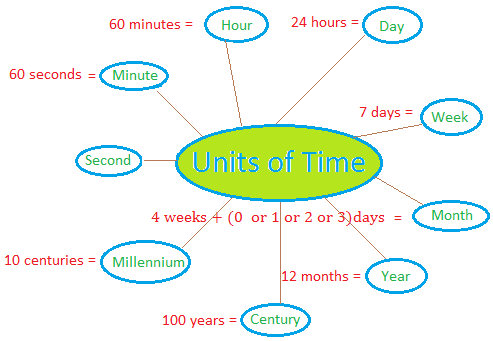Units of time
First, we show units of time that are more common organized as a concept web from the smallest unit to the greatest unit. See more explanations below. Start from second, then go to minute, and so forth...
The basic units of time that we are familiar with from the smallest unit to the greatest unit are second, minute, hour, day, week, month, year, century, and millennium.
Second is the smallest unit on the concept web. To see how fast a second is, do this exercise. Raise your hand up and immediately lower it down. It took you about a second to do this exercise!
60 seconds = 1 minute.
60 minutes = 1 hour.
24 hours = 1 day.
7 days = 1 week.
1 minute is probably the time it takes many people to brush their teeth.
1 hour is the time it takes to watch a TV show. Some shows last only half an hour.
1 day is the time it may take you to drive from Miami to Boston.

How many weeks are there in one month?
Well, it depends. Only February can have exactly 4 weeks on a leap year. Otherwise, February has 4 weeks plus 1 day.
The other months have either 4 weeks plus 2 days or 4 weeks plus 3 days. In order to understand what a leap year is, you can check this site.
12 months = 1 year.
100 years = 1 century.
10 centuries = 1 millennium.
Other less common units of time to mention just a few.
These are millisecond, microsecond, decasecond, fortnight, quarter, decade, olympiad, jubilee, megaannum, jiffy, and Planck time.
1 millisecond = 0.001 second
1 microsecond = 0.000001 second.
1 decasecond = 10 seconds
1 fortnight = 2 weeks (This one is mostly used in Great Britain and some former British colonies)
1 quarter = 3 months.
1 decade = 10 years.
1 olympiad = 4 years.
1 jubilee = 50 years (this one is used in the bible)
1 megaannum = 1 million year.
1 jiffy = 33.3564 microseconds = time it takes light to travel a distance of 1 centimeter according to Gilbert Newton.
1 Plank time = 5.39×10-44 s
Notice that a Planck time is even smaller than a jiffy. In fact, 1 Planck time is actually the shortest measurable time among all the different units of time.